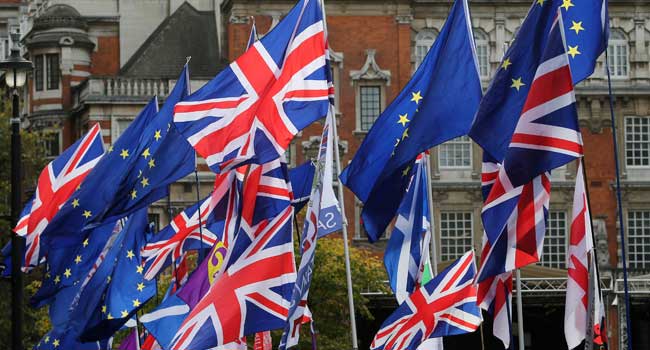
Britain and the European Union on Thursday broke up their latest round of post-Brexit trade negotiations by ruling out a quick deal but voicing hope for agreement in the coming months.
Prime Minister Boris Johnson had promised last month to add “a bit of oomph” to the stalled negotiations when he personally joined them last month.
His main goal then was to get a framework deal struck by the end July that could assure UK businesses they do not have to start preparing for a messy no-deal breakup when the current transition period ends on December 31.
But the sides’ chief negotiators said this was unlikely because of a fundamental gap on major areas such as fishing rights and fair competition rules.
“It is unfortunately clear that we will not reach in July the ‘early understanding on the principles underlying any agreement,” Britain’s David Frost said in a statement.
He accused the EU of failing to recognise Britain’s economic and political independence and described the gulf between the sides on some points as “considerable”.
Frost’s counterpart Michel Barnier criticised London for refusing to move on its red lines.
“By its current refusal to commit to conditions to open and fair competition, and to a balanced agreement on fisheries, the UK makes the trade agreement at this point unlikely,” he told a news conference.
A senior British government official said the sides will try to agree the shape of a potential accord — now more likely to look like one big deal than lots of small ones — at informal talks in London next week.
The British side said it expects “textured” talks on the finer details to begin in mid-August and run though September.
‘Enough to keep talking’
Britain followed through on the results of a deeply divisive 2016 referendum and left the EU after almost half a century of integration on January 31.
It marked a moment of personal triumph for Johnson — a major player in the “Leave” campaign — after he managed to strike and ram though parliament an EU divorce deal that had painfully evaded his predecessor Theresa May.

Britain remains bound by the bloc’s rules until December 31 pending the outcome of negotiations about its future relationship with its largest trading partner.
Johnson decided last month against extending the transition because of its political risks.
London also argues that more time will not resolve basic differences on how the sides view their future ties.
Brussels says Britain’s proximity and past membership mean it must abide more closely to EU standards than other nations if it wants open market access.
London counters that it is only asking for the same treatment the EU has given other independent nations that signed up to trade deals.
A failure to bridge this divide will reduce ties to minimum standards set by the World Trade Organization.
These are accompanied by higher tariffs and make onerous demands on businesses that can imperil trade and dampen confidence of EU investors in Britain.
German Chancellor Angela Merkel said the bloc “must and should” prepare for the possibility when her country took over the EU presidency on July 1.
Yet neither London nor Brussels are giving up hope.
“The progress is genuine,” said the senior UK government official. “There is enough in these talks to keep talking.”
The UK official called Barnier’s warning that negotiations could fail if the sides do not budge from their positions “a truism”.
“Obviously, we if we don’t agree on those points, there isn’t going to be a deal,” said the UK official.
“When the process stops being useful and there is no way or reaching an agreement, there is no more point in talking. We are not at that point yet.”
Barnier said that he was ready to keep talking “to the 11th hour”.
“There was never any question of David Frost nor on my side of abandoning negotiations,” he told reporters. “Far from it.”
AFP

0 Comments